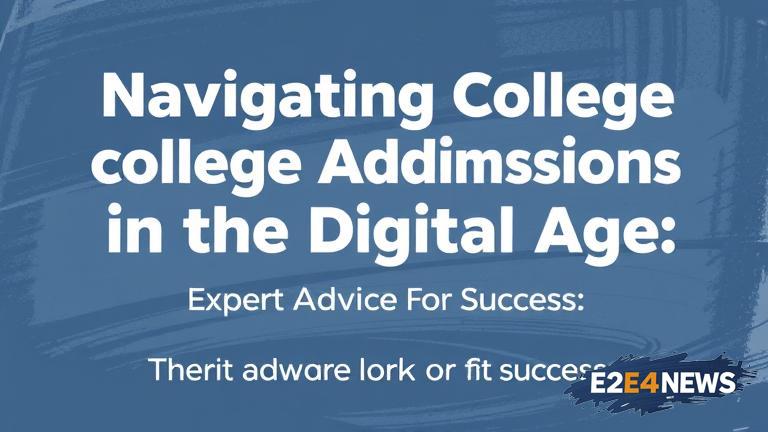As the college admissions landscape continues to evolve, prospective students and their families are seeking guidance on how to navigate the process. With the increasing importance of digital presence and the rise of artificial intelligence, it’s essential to stay informed about the best strategies for success. Starting early is crucial, as it allows students to explore their interests, develop their passions, and create a strong foundation for their applications. By beginning the process well in advance, students can also avoid the stress and pressure that often accompanies last-minute submissions. Moreover, authenticity is key when it comes to college admissions. Students should focus on showcasing their genuine interests, skills, and experiences, rather than trying to present a fabricated image. This not only helps to build a stronger connection with the admissions committee but also ensures that students are applying to institutions that align with their true goals and aspirations. The responsible use of artificial intelligence is also a vital consideration. While AI can be a valuable tool in the college admissions process, it’s essential to use it wisely and avoid relying too heavily on automated systems. By striking a balance between technology and human insight, students can create applications that are both personalized and effective. Furthermore, students should prioritize building meaningful relationships with teachers, mentors, and other adults who can provide guidance and support throughout the process. These relationships can lead to valuable recommendations, internships, and other opportunities that can enhance a student’s application. In addition to these strategies, students should also stay organized and focused, using tools like calendars and to-do lists to manage their time and responsibilities. By maintaining a clear sense of direction and purpose, students can avoid feeling overwhelmed and ensure that they’re making progress towards their goals. It’s also important for students to remember that college admissions is a holistic process, and that admissions committees consider a wide range of factors when evaluating applications. These factors can include academic performance, extracurricular activities, community service, and personal statements, among others. By taking a comprehensive approach to the application process, students can create a well-rounded and compelling profile that showcases their unique strengths and abilities. Ultimately, the key to success in college admissions is finding a balance between preparation, authenticity, and responsible AI use. By following these tips and staying focused on their goals, students can navigate the college admissions process with confidence and achieve their full potential. With the right mindset and strategies, students can unlock a world of opportunities and set themselves up for success in their future endeavors. The college admissions process may seem daunting, but with the right approach, it can also be a transformative and empowering experience. As students embark on this journey, they should remember to stay true to themselves, seek guidance from trusted adults, and use technology in a way that supports their goals. By doing so, they can create a strong foundation for their future and achieve their dreams. The use of AI in college admissions is a topic of growing interest, and students should be aware of the potential benefits and drawbacks of this technology. While AI can help with tasks like essay writing and data analysis, it’s essential to use these tools in a way that complements human insight and judgment. By finding a balance between technology and human perspective, students can create applications that are both personalized and effective. In conclusion, navigating college admissions in the digital age requires a combination of preparation, authenticity, and responsible AI use. By following these tips and staying focused on their goals, students can achieve success and unlock a world of opportunities. The future of college admissions is likely to be shaped by technological advancements, and students should be prepared to adapt and evolve in response to these changes. With the right mindset and strategies, students can thrive in this new landscape and achieve their full potential.
